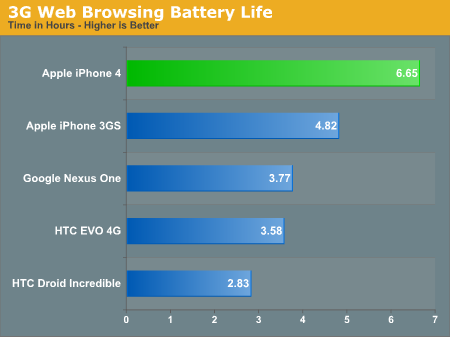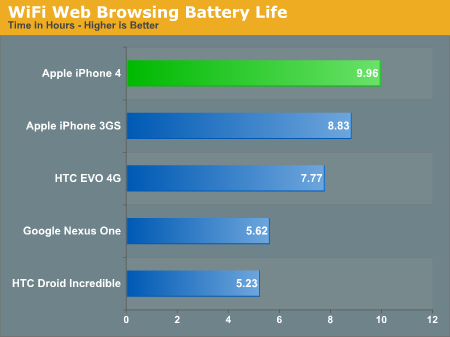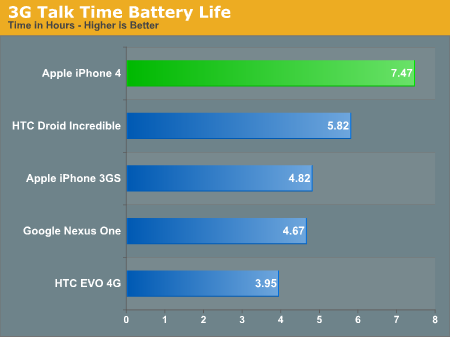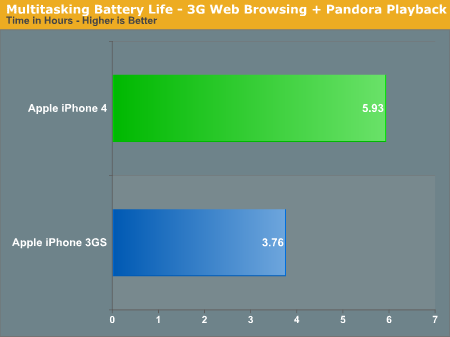Apple's iPhone 4: Thoroughly Reviewed
by Brian Klug & Anand Lal Shimpi on June 30, 2010 4:06 AM EST- Posted in
- Smartphones
- Apple
- iPhone 4
- Gadgets
- Mobile
Incredible Battery Life
I’ve publicly praised Apple for its honesty in reporting battery life over the past couple of years, and the iPhone 4 gives me no reason to stop.
The 4 has an integrated 5.25Whr battery. That’s around 95% of the battery capacity of the HTC EVO 4G, despite having much lower power frequirements. It’s also a 16% increase over the 4.51Whr battery that was in the iPhone 3GS. This means at bare minimum, assuming the iPhone 4 doesn’t draw any more power than the 3GS, we should get 16% more battery life.
In reality, we get much more.
When Apple introduced the iPhone 3G it dropped battery life to a level that we’d been stuck at ever since. The 3GS improved battery life a bit through better CPU power efficiency but you still didn’t have enough juice to get through a day without charging.
The iPhone 4 changes all of that. The combination of a larger battery and a more power efficient SoC results in an incredible amount of battery life.
Our first test is a basic web browsing benchmark. We've scripted almost two dozen webpages to load, pause for 20 seconds, then forward on to the next page. None of the pages use any Flash. This process repeats until the battery is dead. Screen brightness on the iPhones was set to 50% and the screens remained on the whole time.

Battery life improved nearly 38% with the iPhone 4. It's clear that while the A4 improved performance, the real improvement was in battery life. This test has enough idle time where good power management and low idle power can really impact the results. There's simply no other similar smartphone that can touch the 4's battery life.
We then repeated the same test over WiFi instead of 3G:

Apple claims the iPhone 4 will last for up to 10 hours over WiFi, we measured just under that at 9.96 hours. The improvement here is only 12.8%, which tells me that we're nearing the limit of how efficiently Apple can manage power in WiFi mode. There's a wall that we're quickly approaching with this current architecture.
To measure talk time we play MP3s on repeat into the mic of a phone and use it to call the phone being tested. The process continues until the test phone dies. In this case the screen is allowed to go to sleep, as it normally would be if you were talking on the phone:

Apple promised up to 7 hours of 3G talk time with the iPhone 4. We measured 7.47 hours. That's an increase of 54.9% over the iPhone 3GS. While in a phone call the majority of the A4 SoC is powered down, so the efficiency improvements here have to do with how much less power the A4 consumes while off and the new Skyworks 3G modem (the iPhone 3GS used an Infineon modem).
In our iOS 4 review we looked at the impact multitasking had on the iPhone 3GS' web browsing battery life. I ran our 3G web browsing test while playing music through Pandora in the background. I repeated the test with the iPhone 4 for today's article:

We actually see our largest battery life improvement in this test. With a 57.7% increase in battery life over the 3GS, the iPhone 4 is not only more efficient at idle workloads but also when the SoC is constantly busy. The A4 SoC is rumored to be built on a 45nm process compared to the 65nm SoC used in the 3GS. With a moderate increase in clock speed we should be seeing a lot of the power savings that a full node shrink brings to the table.
The battery life offered by the iPhone 4 is spectacular. My iPhone 3GS could hardly get through a full day of work while traveling, I'd always need to hunt for an outlet before heading into my dinner meeting. I'm about to take my first trip with the iPhone 4 but I get the feeling that I might finally be able to make it through dinner.
Early reports of 20 and 30 hours of battery life are simply exaggerated. They're only possible if you let the phone idle in your pocket for the majority of that time. In other words, if you don't use the phone it lasts for a long time. While that's a testament to the platform's incredible idle power, the real world usage is good enough to stand on its own. It's better than any iPhone or Android phone I've tested thus far.










270 Comments
View All Comments
macmanitou - Monday, July 5, 2010 - link
Hi Brian,great article, but one question just pops in my mind looking at the signal attenuation table, is the iPhone 3GS really the best? If yes I should really stick to it and probably just cancel the iPhone 4 order ;)
Sascha
isotropic - Monday, July 5, 2010 - link
Posted by: isotropic | 07/5/10 | 5:01 pm |This link Shows a Test phone TEMS sony/Ericsson K800i test phone (cost 2500+ Euro) being given the grip of death. A test done in a few minutes. It shows at a given point up to 16 dB losses by being held tightly as I have seen people doing it on the new iPhone. Not saying the iPhone could not have a problem, I don’t own one. But the iPhone is not alone for sure on this one. And Apple’s latest explanation seems pretty valid to me
http://www.youtube.com/watch?v=OWpGOxyEoZc&fea...
Akv - Monday, July 5, 2010 - link
I don't mind being locked in the Apple network for my iPod, because I find iTunes a quite convenient solution. However for a professionally strategic device like my cell phone, I would prefer a more independent solution.Besides, I still think it doesn't bring enough for the price. I could buy an excellent netbook for less than that price, and I would still have some money left for a simple but efficient clamshell phone.
ifartinyoutdirection - Monday, July 5, 2010 - link
It is a featurehttp://henriko.se/extern/iphone4buttonsandcontrols...
davehutch - Tuesday, July 6, 2010 - link
Your screen captures don't actually reflect what is being recorded. The video capture screen is a full-screen version that is not showing the correct ratio. the screen should be double-tapped for a tru representation and yes, the video angle of view is indeed smaller than the still image angle of view.please see my post here:
http://forums.macrumors.com/showpost.php?p=1044575...
for additional screenshots and comments.
r2d2droid - Tuesday, July 6, 2010 - link
Interesting. . . but I still want a droid.estarkey7 - Tuesday, July 6, 2010 - link
Why didn't you use Sprint's Everything plan pricing? For $99.00+$10.00 for the Evo 4g tax you get unlimited EVERYTHING, now add in tethering and see where that brings Sprint in comparison with AT&T and Verizon.Different ballgame all together, because 900 min is nothing. I talk 1200+ every month.
RadioGuru - Tuesday, July 6, 2010 - link
Hello guys. Thanks for the review. I have a quick question. Your wrote that "To generate these numbers, I measured at least 6 times and took the average"I wonder, did you convert the dBm number to linear, took the average and the recalculated the numbers back to dBm, or took the average using the dBm values. If you did the later, the numbers are completely wrong.
Your testing is better than most of what I have seen online so far, but real engineering testing has revealed that the TIS (Total Isotropic Sensitivity) of iPhone4 in Free Space is better than the 3GS, which is great!!!! but.....and here comes the big but....phamtom head testing of WCDMA 1900 TIS/TRP spec testing has shown a degradation of close to 30 to 40 dB in chamber testing. Which means a controlled lab environment...not a cowboy lab testing like the one you used. Sorry, I respect your work and I support what you do...but this time of evaluation requires far more engineering power.
in WCDMA/HSDPA systems, a call dropped is usually driven by reverse link limitaiton. Therefore engineers also consider TRP (Total Radiating Power) to measure antenna performance. in the case of iPhone4, TRP degradation due to HAND+HEAD is close to 40 dB, which will kill the call or increase drop calls or reduce data througput performance.
By the way, BAR maping using SNR makes sense for HSDPA data calls. GSM calls should use RSSI.
jacobdrj - Thursday, July 8, 2010 - link
You rock.dalebeal - Friday, July 9, 2010 - link
This is the most comprehensive review I have read - and I've read a lot of them. Thank you!